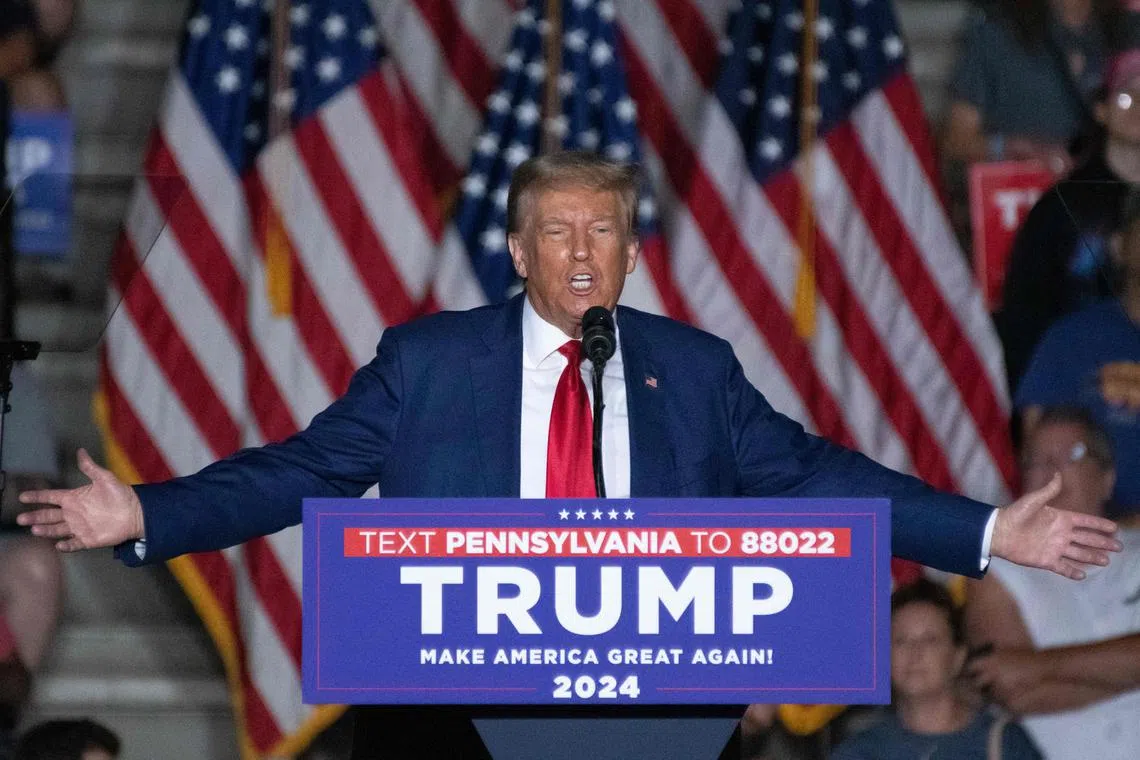What Trump’s indictments mean for his 2024 presidential run
Sign up now: Get ST's newsletters delivered to your inbox

The legal scrutiny could feed former US president Donald Trump's narrative that he is being unfairly targeted.
PHOTO: AFP
Follow topic:
WASHINGTON – Former US president Donald Trump’s latest run for the White House is being complicated by a slew of legal onslaughts, the latest being an indictment over his efforts to overturn the 2020 presidential election he lost.
Earlier, he was charged with mishandling classified documents
In addition, a jury found him liable for sexually abusing a woman decades ago.
Trump is no normal politician, though, and the legal scrutiny could feed his preferred narrative that he is being unfairly targeted by a “deep state” bureaucracy and the Democratic administration of President Joe Biden, his potential opponent in the 2024 General Election.
What are the newest charges?
In an indictment filed in federal court in Washington on Tuesday, Trump was charged with three criminal conspiracies to subvert the 2020 presidential election.
He is accused of trying to undermine the counting of votes and the certification of the results; with obstructing a congressional investigation into attacks on the US Capitol on January 6, 2021, as Congress was making that certification; and with conspiring against people’s right to vote and to have their votes counted.
The charges from the office of Special Counsel John L. “Jack” Smith carry penalties of as much as 20 years in prison.
The Democrat-led House of Representatives committee that investigated the Capitol riot had recommended that the US Justice Department charge Trump with insurrection.
Such criminal referrals from Congress carry no legal weight on their own, and the charge is not part of the indictment.
What has Trump said about Jan 6?
Trump has defended his actions surrounding the 2020 election by repeatedly making the debunked claim that it was rigged against him and that Mr Biden benefited from millions of illegal votes.
He argues that the Jan 6 insurrection was not his fault – he blames then House Speaker Nancy Pelosi and other Democrats for alleged security failures – and that his rally before the attack was peaceful even though he urged his followers to “fight like hell”.
Trump has also suggested that if he were re-elected, he would pardon potentially hundreds of individuals who were charged with crimes over the attack, which resulted in injuries to more than 140 police officers and millions of dollars in damage.
Can Trump still run for president?
The US Constitution, which sets the qualifications for president, says nothing that would bar Trump from running or even taking office while facing charges or serving a sentence for the crimes he is currently charged with.
Of course, an active prosecution or prison sentence would present all manner of practical and political difficulties.
The 14th Amendment to the Constitution, enacted in the aftermath of the Civil War, includes a provision that no one can hold a seat in Congress, or “any office, civil or military”, if they “engaged in insurrection or rebellion”.
A number of advocacy groups have said they would sue to apply the prohibition to Trump or pressure state governments to disqualify him from ballots.
How much do these cases hurt Trump politically?
Trump has remained the Republican front runner for the nomination and has even received bumps in fund raising and in the polls after being indicted.
In polling as at Tuesday, roughly 56 per cent of Americans said they viewed Trump unfavourably compared with 40 per cent who viewed him favourably.
An Economist/YouGov poll conducted in March showed that opinions of Trump’s legal travails largely align with how people view him more generally.
Offered the basic outline of the hush money charge, without Trump’s name attached, poll respondents overwhelmingly agreed that it’s “a crime for a candidate for elected office to pay someone to remain silent about an issue that may affect the outcome of an election”.
But when the question was rephrased to be specifically about Trump, just 15 per cent of Republicans called it a “very serious” issue, compared with 53 per cent of Democrats.
Trump has long tried to cast lawsuits against him and investigations into his conduct as politically motivated, calling them “hoaxes” and “witch hunts”. BLOOMBERG

